How to Incorporate Your Roofing Into the Landscape
http://decor-ideas.org 01/13/2015 03:13 Decor Ideas
The best landscapes connect with the homes that sit atop them in both large and small ways. Attention to detail is what will move your space from ordinary to extraordinary. Pulling hues from brick, stone or painted siding into the landscape with thoughtful plant choices is one thing, but what about that roof? Whether you’ve purchased a home with unusually colored shingles, built a home with a colored metal roof or inherited a home crowned with a tile roof, the principles are the same. Let’s see how to tackle your dilemma and ground your home in your landscape.
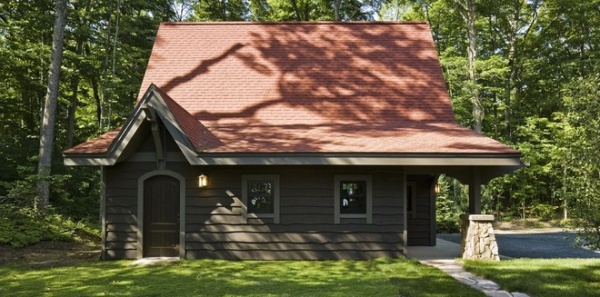
Homeowners frequently forget to look up when designing their landscapes. Sometimes, I think, they are secretly hoping their challenging roofs will just go away. But for a seamless home-garden connection, there should be a continuous flow, with all parts supporting the others.
Consider three things: color, texture and shape. After addressing these three things, consider accessories to bring all parts of your composition together.
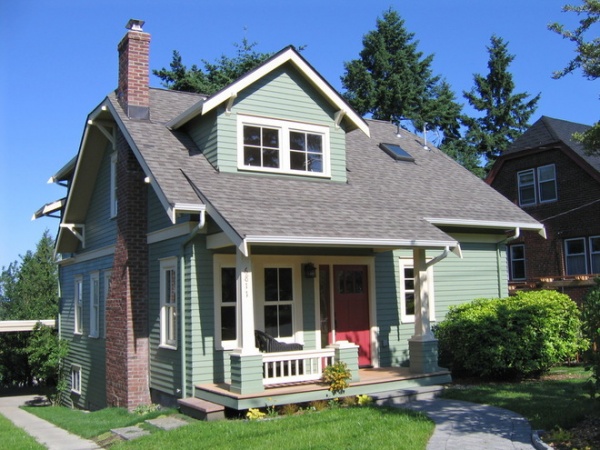
Color
Roofing is available in myriad colors, some safer and easier to work with than others. Hardscape, such as sidewalks and decking, can be chosen to create continuity through color. If you have purchased a home that presents a challenge to you in this respect, consider painting or staining your ground-level hardscape to create a connection.
The sidewalk pavers in this photo do their job mimicking the color of the shingles and pulling it to the ground level, creating a homogenous vibe.
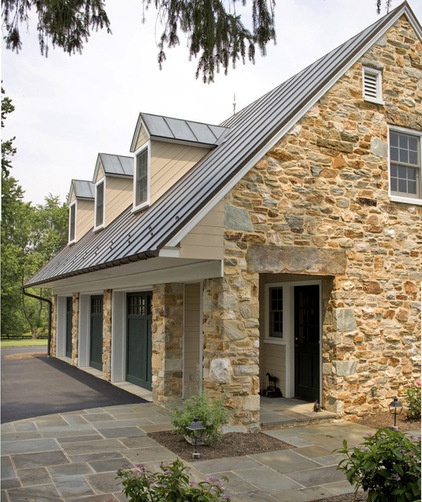
The cut stone pavers in this photo do double duty, picking up both the hue of the home’s metal roof and the gray in the stone cladding. Notice how the shape of the pavers speaks to the vertical seams of the roof, then visually pushes the eye outward toward the greater landscape.
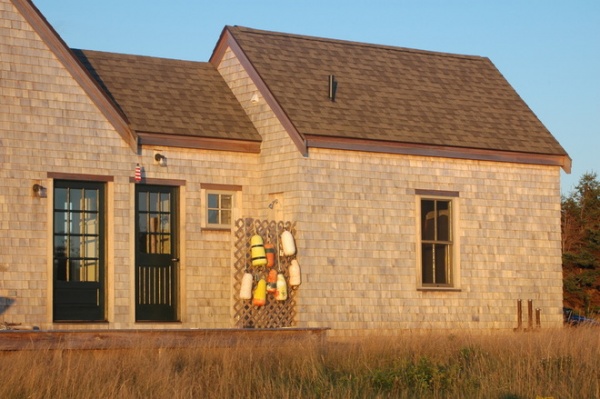
Your planting scheme is of paramount importance when it comes to creating this color connection. Notice how this lawn of ornamental grass picks up the darker tone of the roof and contrasts with the lighter tone of the house siding, creating a harmonious feeling. Ornamental grasses are valuable tools in creating this connection. Species and cultivars can be found in a wide range of hues, such as blue, orange, red, pink and green.
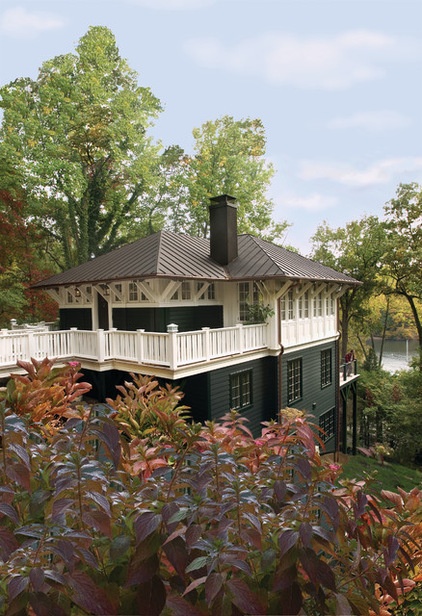
Metal roofs with orange or brown metallic hues can easily be complemented or contrasted with foliage. Consider Coppertina or Center Glow ninebark (Physocarpus opulifolious cvs, zones 3 to 8; find your zone), Orangeola Japanese maple (Acer palmatum var dissectum ‘Orangeola’, zones 5 to 8) or Buttered Rum coral bells (Heucherella ‘Buttered Rum’, zones 4 to 9). Don’t neglect seasonal foliage color provided by shrubs such as oakleaf hydrangea (Hydrangea quercifolia, zones 5 to 9).
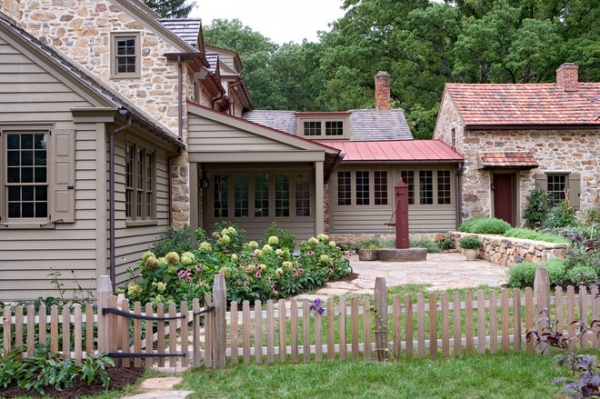
Notice how these pink coneflowers (Echinacea cvs, zones 4 to 8) pull color from the metal and tile roofing of this home, creating a seamless home-garden connection. Joe Pye Weed (Eupatorium purpureum cvs, zones 3 to 8) and Autumn Joy stonecrop (Sedum ‘Autumn Joy’, zones 3 to 11) would further reinforce this connection.
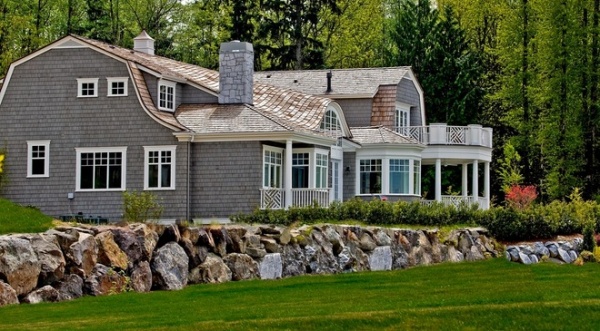
Texture
By playing up texture, you can help your home and garden shine among the mundane spaces of your neighbors. As a designer, my goal is to emphasize texture as much as possible.
Some roofing materials have more texture than others. If you have wood shakes, slate or tile on your roof, seize the opportunity to pull that texture into your garden. Notice how the highly textural wood shakes on this home make a connection with, and are emphasized by, the stone retaining wall. The boulders pull color from both the roof and the house siding and bring their texture to prominence.
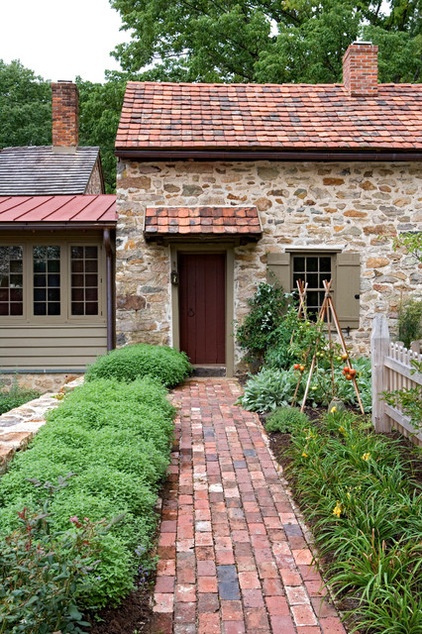
Notice how both the color and texture of the roof tiles on this home are pulled forward into the garden by the old brick sidewalk. The materials share color and texture, even though they are different, creating a meaningful home-garden connection.
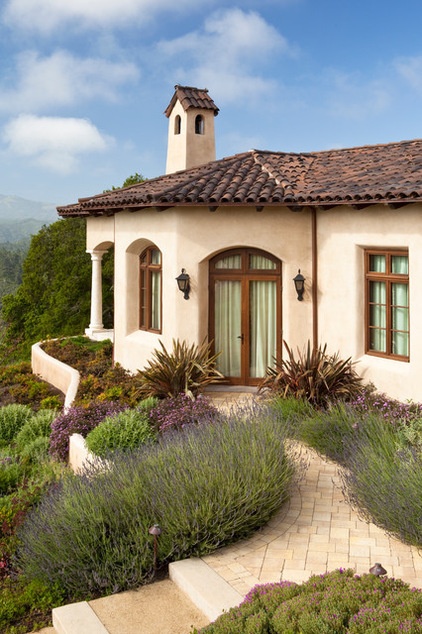
Up to this point we’ve looked at using hardscaping to pull texture from the home into the garden, but plants can also create this connection. Notice in this photo how the roofing texture is pulled down by informed plantings, starting with New Zealand flax (Phormium sp). The designer of this space starts the mental connection for us by repeating the roof color in the plants closest to the house. Moving farther away from the foundation, the texture then takes over with lavender and heathers. The lesson learned from this well-designed vignette is that you can make the plants closest to the home the ones that most resemble it in color and texture, to set the precedent for the rest of the garden.
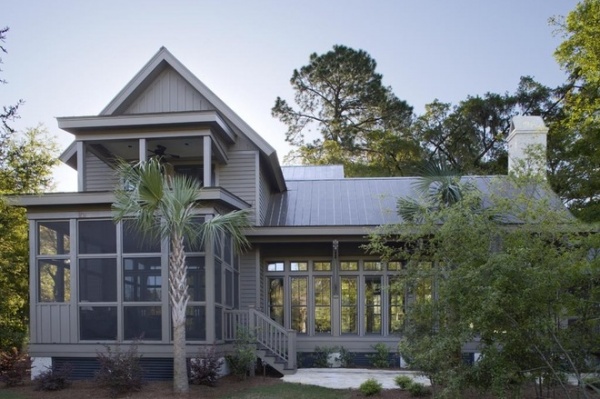
Shape and Line
Shape and line make up our third parameter. If your roofing material has a prominent shape or pattern, accentuate that to create your connection. Notice how the vertical seams in the metal roof shown here are emphasized by the placement of the tall, structural palm tree. Additionally, the color of the palm’s trunk pulls from both the siding stain and the roof, while also adding texture.
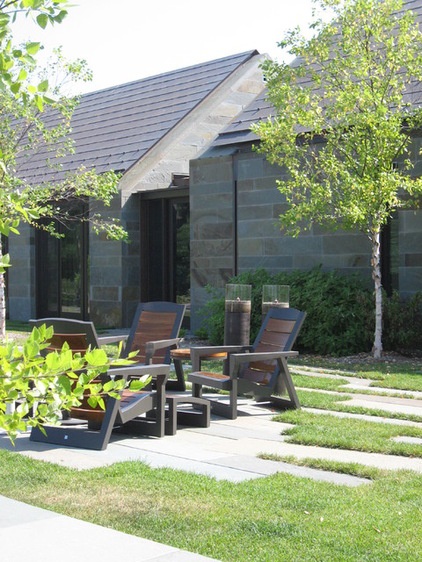
In this example the primary line, or run, of the roofing material is picked up by the stone siding, then brought down to the garden floor with the staggered edges of the stone patio. Also notice how the lines of the patio furniture further reinforce the connection to the home. This kind of attention to detail is what will create a professionally designed look in your space.
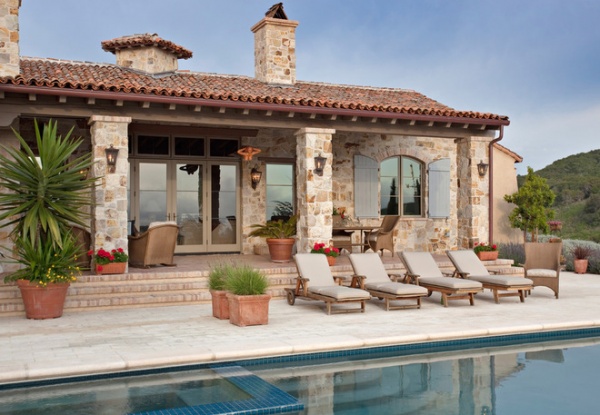
Accessories
The proper selection and placement of accessories will make or break your space. Ceramic or terra-cotta pottery, sculpture, light fixtures, mailboxes and house numbers are all fair game to use in achieving your home-garden connection.
Notice how the Italian terra-cotta pots on this terrace beautifully pull out the color of the roof, grounding the terrace in the space. Good-quality pottery is an investment, but a worthy one.
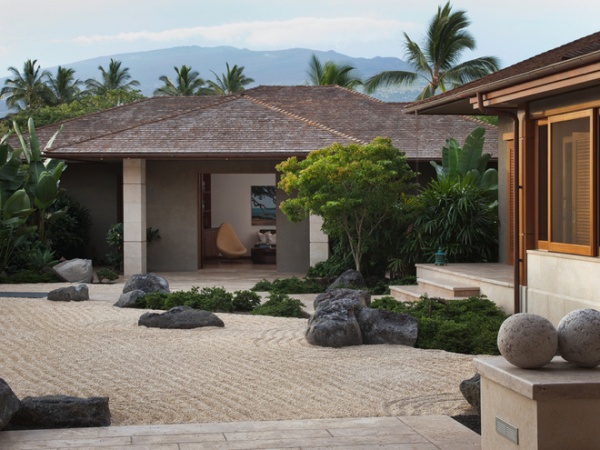
Notice how the boulders in this almost-monochromatic garden add texture while pulling out the gray from the shingles. Meanwhile, the crushed stone on the garden floor seems to flow effortlessly from the house, making a second meaningful connection between home and garden.
Choose your boulders carefully to create your connection, remembering color, texture, size and shape. An ill-chosen boulder can be an eyesore rather than an asset in your design.
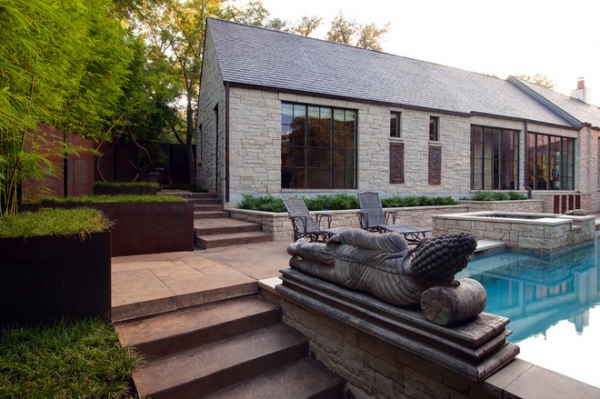
Well-chosen and well-sited sculpture is a primary tool in the creation of a connection. Notice how this Asian piece picks up the color, line and texture of the roof, grounding the home in its space.
More:
How to Make Your Painted or Stained House Feel at Home in the Landscape
Upgrade Your Front Yard for Curb Appeal and More
Related Articles Recommended












